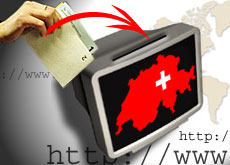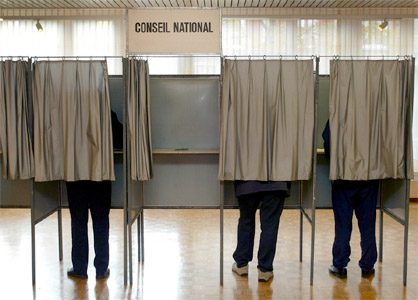Record figures expected in landmark election

October’s parliamentary elections are likely to draw a record number of candidates, say the federal authorities, who are hoping for a turnout above 50 per cent.
For the first time a number of Swiss expatriates can have their say in a national election online as part of continuing trials with electronic voting.
“The preparations for the national elections will peak in less than seven months from now,” Federal Chancellor Corina Casanova said at Monday’s news conference in Bern to launch the planning and coordination of the poll to be carried out in Switzerland’s 26 cantons.
Although the exact number of candidates is not available until September, Casanova is confident that it will exceed the 3,089 reached at the previous elections four years ago.
She highlighted that a number of new parties, including the centre-right Conservative Democratic Party or the Pirate Party, will enter the ring and that others had undergone a slight revamp in the hunt for more votes.
But regardless of party colours, Casanova, who acts as head of the cabinet office and the federal administration’s chief of staff, would like to see a high voter turnout on October 23 and more women in parliament.
“In the interest of our political system of direct democracy I hope we will break through the 50 per cent barrier. It’s time Switzerland makes an effort,” Casanova said.
In 2007 turnout was 48.6 per cent, but back in 1975 participation had reached 52.4 per cent.
Milestone
The forthcoming elections are also billed as a milestone for electronic voting.
For the first time, citizens will be able to cast their vote online in a national election. This privilege is limited however to about 21,500 Swiss abroad registered in four cantons: Basel City, Aargau, St Gallen and Graubünden.
E-voting is part of continuing trials, with the system initiated more than ten years ago and having been tested in votes on specific issues both on a cantonal and nationwide level.
“Even though only a small percentage of citizens can benefit in October, it is a landmark,” Casanova said.
Peter Grünenfelder, secretary-general of the Aargau cantonal government, is optimistic that e-voting is a winning ticket for direct democracy.
His canton is among four to have applied to participate in the e-voting trials in October.
“E-voting could even be a bigger success than the introduction nearly 20 years ago of voting by post,” he said.
Step by step
E-voting creates added value particularly for the Swiss abroad and could make up for the disadvantages of postal votes: the high costs and unreliable service in some countries.
Grünenfelder also thought to dispel security concerns over online voting, highlighting the cooperation between the federal and cantonal authorities as well experts of the Federal Institute of Technology in Zurich.
“Confidence of citizens in the flawless organisation of votes and elections is the tenet of our democratic system,” he said.
To date, nearly half the cantons have taken part in trials with a limited number of citizens mainly living in Switzerland.
However, the pioneering cantons – Neuchâtel, Zurich and possibly Geneva – have called for a temporary halt to their participation in the tests.
Even so, Switzerland is at the forefront of the introduction of e-voting. Norway and Estonia are the only countries to pursue the new system, according to Casanova, who admitted Switzerland might not be very fast but it had its reasons.
“We take our time, it’s true. We proceed as if we were in the mountains – advancing step by step. Once past an obstacle, we secure before tackling the next stage,” she said, using mountaineering language.
Step in right direction
The Organisation of the Swiss Abroad (OSA), representing the nearly 700,000 expatriates around the world, has welcomed the participation of at least four cantons in e-voting trials during the parliamentary elections.
“The decision is a step in the right direction to allow expatriates to exercise their political rights with e-voting in a simple and time-saving way,” a statement said.
For several years OSA has been calling for the swift introduction of online voting as a basic right and a matter of equal opportunities between Swiss citizens at home and abroad.
The organisation hopes other cantons will also grant registered expats the same possibility.
Overall there are about 130,000 expats who have registered to take part in votes and elections in Switzerland.
On October 23 all the 200 members in the House of Representatives and most seats in the 46-strong Senate will be up for election for the next four-year term.
Elections take place every four years in the second half of October.
The new parliament will choose the seven-member cabinet on December 14.
More than 3,100 candidates from more than 12 political groups are expected to stand.
About 5.1 million citizens are eligible to vote.
The elections cost up to SFr20 million ($21.8 million).
More than 75,000 people, mainly volunteers, are involved in organising the ballot, including vote counting.
About 3,200 polling stations will be open across the country.

In compliance with the JTI standards
More: SWI swissinfo.ch certified by the Journalism Trust Initiative





You can find an overview of ongoing debates with our journalists here. Please join us!
If you want to start a conversation about a topic raised in this article or want to report factual errors, email us at english@swissinfo.ch.